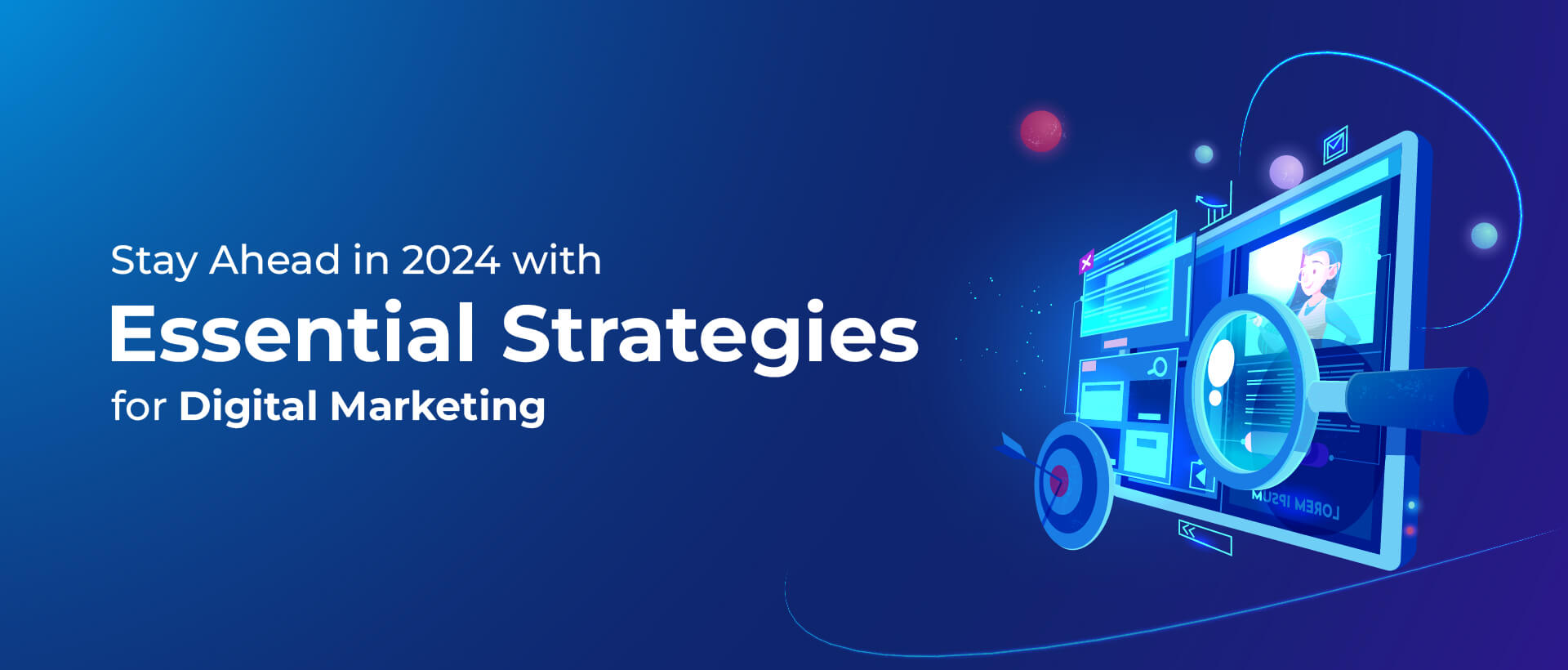
In the ever-evolving world of digital marketing, standing still is the fastest way to fall behind. As we embark on 2024, it is crucial to stay ahead of the curve and embrace the latest digital marketing trends. This not only helps businesses stay relevant, but also opens new avenues to engage with their audience.
From the rise of artificial intelligence to the increasing importance of mobile-first strategies, 2024 is set to be a transformative year for digital marketers. Today, AI, voice search, AR, mobile-first, and social media SEO are key marketing strategies for 2024. In this blog, we will dive into these key trends and provide insights on how to leverage them effectively.
Artificial Intelligence (AI) is no longer a futuristic concept; it is here and making a significant impact on how businesses operate, especially in the realm of digital marketing. AI has the potential to transform the digital marketing trends we know, making them more personalised, efficient, and effective.
AI’s ability to analyse data and learn from it allows businesses to deliver a more personalised experience to their customers. For instance, AI-powered chatbots can provide instant customer service, while AI-driven analytics tools can offer insights into customer behaviour, helping marketers tailor their strategies accordingly.
A real-world example of AI in action is the use of predictive analytics in marketing. Companies like Amazon and Netflix use AI to analyse customer data and predict future buying behaviours. This allows them to provide personalised recommendations, enhancing the customer experience and increasing sales.
Another example is the use of AI in content creation. Tools like Articoolo and Quill can create human-like content, which can be particularly useful for businesses that need to produce large amounts of content quickly.
In 2024, the role of AI in digital marketing is set to grow even further. As marketers, staying abreast of the latest AI trends will be crucial to staying competitive in the digital landscape.
The Growing Importance of Optimising for Voice Search
In the rapidly evolving digital landscape, Voice Search has emerged as a significant trend that is reshaping the way users interact with their devices. The convenience of speaking directly to our devices and receiving instant, spoken responses has led to a surge in voice search usage. This trend is only expected to grow, with ComScore predicting that 50% of all searches will be voice searches by 2024.
The rise of voice search has significant implications for digital marketing. Traditional text-based SEO strategies may not be as effective in a world where users are speaking, rather than typing, their queries. Voice search queries tend to be longer, more conversational, and often phrased as questions. This means that optimising for voice search requires a shift towards long-tail keywords and a focus on answering the ‘who,’ ‘what,’ ‘where’, ‘when’, ‘why’, and ‘how’ questions that users might ask their voice assistants.
AR in marketing has opened new dimensions for brands to interact with customers. It is no longer about just seeing a product; it is about experiencing it in a virtual space. This immersive technology is transforming the marketing landscape by providing a richer, more engaging customer experience.
One of the most common uses of AR in marketing is in the retail sector. Brands like IKEA and Sephora have leveraged AR to allow customers to virtually ‘try before they buy.’ IKEA’s AR app, for instance, allows customers to visualise how a piece of furniture would look in their home before making a purchase.
AR is also being used in experiential marketing campaigns to create memorable brand experiences. For example, Pepsi Max created an unforgettable bus shelter advertisement in London that used AR to make it appear as though a variety of wild scenarios, such as a giant robot invasion or a tiger running loose, were unfolding in the street in front of the unsuspecting users.
In the realm of social media marketing, platforms like Snapchat and Instagram offer AR filters that brands can customise to create interactive campaigns. These filters can be fun, engaging, and shareable, helping to increase brand visibility and engagement.
In the digital age, mobile-first strategies have become more than just a trend; they are a necessity. With most internet users accessing the web via mobile devices, businesses can no longer afford to treat mobile optimisation as an afterthought.
The mobile-first approach is about designing an online experience for mobile before designing it for the desktop or any other device. This approach is essential because it allows businesses to capture the attention of the mobile user, who typically has different needs and limitations compared to desktop users.
One of the key aspects of a mobile-first strategy is the design. Mobile screens are smaller, which means that the design needs to be more streamlined and intuitive. The user interface needs to be easy to navigate with a touch screen, and the content needs to be easily consumable on a small screen.
In the dynamic world of digital marketing, the integration of social media marketing and SEO has become more crucial than ever. Social media platforms, with their billions of active users, have transformed into a vital arena for businesses to promote their products, engage with their audience, and enhance brand visibility.
Simultaneously, these platforms have evolved into powerful tools for market research. By analysing social media behavior, businesses can gain valuable insights into customer preferences and emerging trends. This data can be leveraged to create marketing strategies that resonate with the target audience and drive engagement.
In conclusion, as we navigate through 2024, the role of social media in digital marketing continues to expand. The convergence of social media marketing and SEO presents businesses with unique opportunities to connect with customers, increase visibility, and enhance their digital marketing efforts.